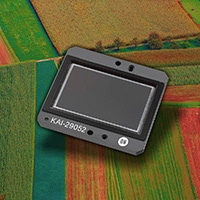New 29-megapixel CCD image sensor combines high resolution with enhanced imaging performance for high-end security, machine vision, and aerial surveillance.

ON Semiconductor, driving energy efficient innovations, is improving performance for industrial imaging applications that require both high resolution image capture and maximum image uniformity.
The new 29 megapixel KAI-29052 image sensor provides up to twice the imaging sensitivity of the existing KAI-29050 in the wavelength range of 500 nanometer (nm) to 1050 nm. This improved performance is particularly beneficial to applications operating in near-infrared (NIR) wavelengths, such as 850 nm.
This enhanced pixel design retains isolation of charge from one photodiode to another, enabling this increase in sensitivity without any reduction to image sharpness (Modulation Transfer Function, or MTF). In addition, an improved amplifier design reduces read noise by 15%, increasing the linear dynamic range available from the device to 66 decibel (dB). With these enhancements, the KAI-29052 serves as a new performance benchmark for high resolution image capture.
The evolving needs of industrial imaging applications such as high end security, machine vision, and aerial surveillance and mapping require continued advancements in the portfolio of image sensors serving this market.
The enhanced performance available from the KAI-29052 is a further demonstration of ON Semiconductor’s ongoing commitment to provide the most advanced CCD and CMOS image sensors for these demanding markets.
Herb Erhardt - Vice President and GM, Industrial Solutions Division, Image Sensor Group at ON Semiconductor
The KAI-29052 is now available in a RoHS-compliant CPGA-72 package in Monochrome, Bayer Color, and Sparse Color configurations, and is fully pin compatible not only with the existing KAI-29050 image sensor but also a full family of 5.5 micron and 7.4 micron CCD image sensors, enabling camera manufacturers to quickly adopt the new device.
Evaluation kits for ON Semiconductor’s full family of Interline Transfer CCD image sensors are now available, allowing the performance of devices such as the KAI-29052 to be examined and reviewed under real-world conditions.
Customers can order an evaluation kit by contacting their local ON Semiconductor sales representative or authorised distributor. More information on the KAI-29052 is available on the company’s blog.